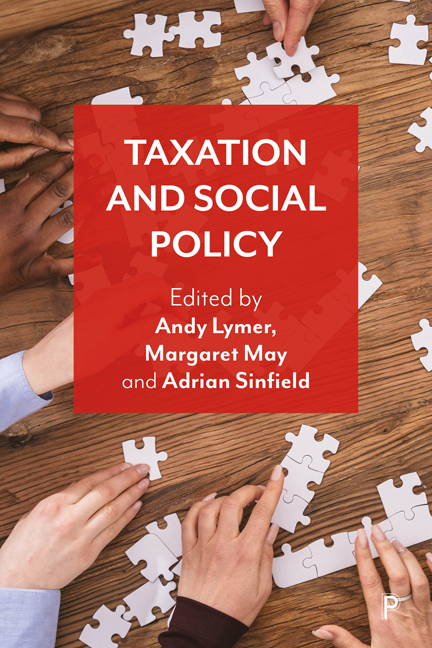Book contents
- Frontmatter
- Contents
- List of figures and tables
- List of abbreviations
- Notes on contributors
- Acknowledgements
- 1 Introduction: The case for considering taxation and social policy togethe
- 2 Fiscal and social policy: two sides of the same coin
- 3 Tax and the social policy landscape
- 4 Fiscal welfare and tax expenditures
- 5 Employment, self-employment and taxation
- 6 Pensions and taxation
- 7 Tax, benefits and household income
- 8 Taxation, health and social care
- 9 Homes, housing and taxation
- 10 Wealth taxation: the case for reform
- 11 Gender and taxation
- 12 Taxation and local taxes
- 13 Corporate tax and corporate welfare
- 14 The climate crisis and taxation
- 15 Conclusions: Taxation in a social policy context
- Index
12 - Taxation and local taxes
Published online by Cambridge University Press: 20 January 2024
- Frontmatter
- Contents
- List of figures and tables
- List of abbreviations
- Notes on contributors
- Acknowledgements
- 1 Introduction: The case for considering taxation and social policy togethe
- 2 Fiscal and social policy: two sides of the same coin
- 3 Tax and the social policy landscape
- 4 Fiscal welfare and tax expenditures
- 5 Employment, self-employment and taxation
- 6 Pensions and taxation
- 7 Tax, benefits and household income
- 8 Taxation, health and social care
- 9 Homes, housing and taxation
- 10 Wealth taxation: the case for reform
- 11 Gender and taxation
- 12 Taxation and local taxes
- 13 Corporate tax and corporate welfare
- 14 The climate crisis and taxation
- 15 Conclusions: Taxation in a social policy context
- Index
Summary
Introduction
Understanding local taxation requires consideration of considerable technical and even obscure detail, but it is a subject with significant ramifications.1 Local taxation, in the form of the poll tax in the 1990s, was the cause of the downfall of a politician of the stature of Margaret Thatcher amid widespread protest, an extensive campaign of non-payment and violence between police and protestors. Earlier in the 20th century, a revolt in the London borough of Poplar against the failure of local taxation to balance between richer and poorer areas led to the imprisonment of councillors including the future leader of the Labour Party, George Lansbury. More recently, 2022 saw part of the government's highly publicised Energy Bills Rebate scheme in response to the contemporary cost-of-living crisis delivered as a local tax rebate. In Wales, also in 2022, changes to local tax were announced as a means of tackling problems created by large numbers of second homes.
For individuals and households, local taxation has a double impact. The amount of tax that has to be paid directly affects people's disposable income, and changes in local tax have immediate consequences for household budgets. The second impact is on the provision of local services. The Local Government Association (a membership organisation of councils in England and Wales) describes local authority functions as affecting everybody every day. It is the breadth of services provided by councils that touches on quality of life from the day to day to the far more profound. Examples range from street lighting to social care, and libraries to child protection. The level of local tax contributes to the extent of services provided. A broken streetlight may not seem of great consequence, but a darkened pavement or road can turn a safe environment into a more dangerous one. The consequences of lack of funding for services such as home care for older people or safeguarding of children can be life threatening.
The focus of this chapter is on England, Scotland and Wales. This is because there is a separate system of local tax in Northern Ireland (see McCluskey et al, 2007). To explain, in England, Scotland and Wales local taxation for most of the 20th century was general rates, briefly replaced by the poll tax and then since 1993, council tax.
- Type
- Chapter
- Information
- Taxation and Social Policy , pp. 202 - 218Publisher: Bristol University PressPrint publication year: 2023



